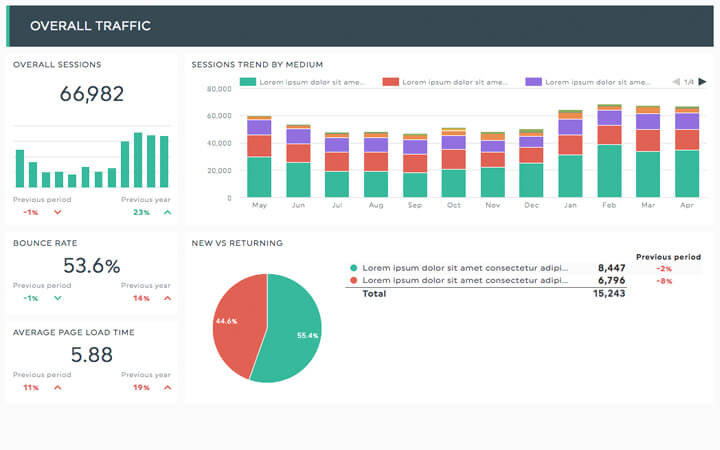Essential SEO Key Performance Indicators and Metrics to Track

For your digital marketing, and more precisely for your search engine optimization (or SEO performance), there are numerous Key Performance Indicators that you need to track to know if your SEO efforts were worth the time spent on your content marketing, meta descriptions, target keywords, etc.
The sheer number of important SEO KPIs can get overwhelming. It's also quite time-consuming to gather all your high-quality SEO metrics for every SEO campaign from all the different SEO platforms (such as Google Analytics, Moz, SEMrush, Google Search Console, or other search engines like Bing).
To simplify your life, you can start off with an SEO report template already pre-filled with all the most important SEO KPIs.
With our automated SEO reports, you won't have to gather your search engine KPIs manually ever again! We'll do all the heavy lifting for you.
Just try it out and see for yourself!
Why should you incorporate SEO into your digital marketing strategy?
Incorporating SEO into your digital marketing strategy is essential for several reasons. SEO improves your website's visibility in organic search results, exposing your brand to a wider audience and generating more organic traffic. It also allows you to attract highly targeted traffic by aligning your content with the needs of your target audience.
What are SEO KPIs
SEO KPIs, or Search Engine Optimization Key Performance Indicators, are specific metrics used to evaluate and measure the performance and effectiveness of an SEO campaign. These KPIs provide insights into a website's visibility, organic traffic, keyword rankings, user engagement, and conversion rates.
Measuring SEO KPIs is crucial for several reasons:
- Performance Evaluation: SEO KPIs help assess the success and effectiveness of SEO efforts. They provide quantifiable data that indicates whether the website is improving its search engine visibility, attracting organic traffic, and achieving desired goals.
- Data-Driven Decision Making: Marketers gain valuable insights into their website's performance by monitoring SEO KPIs. This data can guide strategic decisions and help prioritize and optimize efforts, content creation, and marketing initiatives based on what drives results.
- Performance Comparison: SEO KPIs enable businesses to compare their performance against industry benchmarks, competitors, or previous periods. This comparison helps identify areas for improvement and reveals opportunities to stay ahead in the competitive landscape.
Now, which KPIs should you track in your report?
Essential SEO Key Performance Indicators and Metrics to Track
There are so many ranking factors for SEO, and Google’s algorithm is, to this day, still a mystery, but we know that these KPIs make a difference for your SEO.
Here are the top SEO KPIs and metrics to track.
1. Organic Conversion rate

Conversion rate, as well as your total number of conversions, are crucial SEO KPIs to track. You need to know how many potential customers not only clicked on a particular page but how many completed a goal completion, such as starting a trial or buying a product from your e-commerce site.
2. Organic traffic / organic sessions

Your organic search traffic, or organic sessions, is the number of visitors (or sessions) from a search engine such as Google or Bing. Knowing the specific search queries these visitors come from is crucial to optimize web pages and target those keywords.
3. Click-through rate (CTR)

The click-through rate is the ratio of users who click on your search engine link to the number of total users who viewed your link.
4. Bounce rate

The bounce rate is the percentage of your website's visitors who navigate away from the site after viewing only one page. Having a high bounce rate can either mean that your site content needs a little improvement (maybe it doesn't answer the audience's intent?), that you are not bringing your target audience (or perhaps targeting the wrong audience?), maybe that your page speed is too slow, or that you have crawl errors. If your page loads too slowly, many visitors will likely return to their search engine to try another page instead. Alongside the bounce rate, check your exit pages to see how you can improve them, keeping your visitors longer on your site.
5. Load time

Another important KPI is the load time of your page. It's not only important for the user experience to know how long it took for your page to load. An ideal website load time would be about 2 to 5 seconds, but the faster, the better. Longer than 5 seconds, and you will see your bounce rate get significantly higher. Check your loading time on a website like PageSpeed Insights, which will give you the exact time and action points to improve it.
6. Keyword rankings / search ranking

You need to track specific keywords for which you want your landing pages to rank in the search engine results pages (SERPs). The Google keyword ranking is the position that your website is listed in Google when a searcher types that phrase or keyword. For each search term, you also want to know the search volume/search visibility with your keyword rankings to know how many people will see your page in the results. Performing keyword research and optimizing current and potential keywords on specific pages is crucial to help your SEO.
7. Domain authority

Domain Authority (DA) is a search engine ranking score developed by Moz that predicts how well a website will rank on search engine result pages (SERPs). It's almost your SEO success score.
8. Total number of backlinks

You want to know how many pages and domains link to your website. Link building is an important SEO KPI for your SEO strategy as it should increase your domain authority and, therefore, your SERP. Also, track your referring domains and referrals to better view your backlinks.
9. Pageviews

Pageviews is an SEO metric defined as the total number of pages viewed. Usually, the more pages your visitor sees, the better, as they are more engaged and interested in what you offer.
10. Average session duration

It's important to know the average time your organic traffic spends on your website; the standard is between 2 to 3 minutes; any longer would usually be considered a good average session duration.
How to create an SEO KPIs report?
These KPIs can easily be tracked with multiple different tools such as Google Analytics, Moz, SEMrush, Ahrefs, Google Search Console, and Google My Business for local SEO.
And how do you bring all of those SEO KPIs into one report? With DashThis!
Simply create your complete automated SEO report in seconds.
- Sign in to your Dashthis account or create a new one if you haven't already.
- Once logged in, click the "New Dashboard" button to create a new dashboard.
- Choose a template or start with a blank canvas, depending on your preference. Dashthis offers various pre-designed templates that you can customize to suit your SEO KPI reporting needs.
- Select the SEO data source you want to connect to, such as Google Analytics 4, SEMrush, Moz, or any other SEO tool you use to track your KPIs. Then, add preset widgets or add your most important SEO metrics and dimensions.
- Finally, choose the sharing options for your report. You can generate a unique URL to share the report with stakeholders or schedule automated report deliveries via email at specific intervals.
You can also track all your other marketing strategies and business goals, from brand awareness to sales and pageviews. Simply create a social media report, PPC report, e-commerce report, or any other digital marketing report!
Here are some SEO report templates you could start using right away:
- Google Analytics report template
- Google My Business report template
- SEO report template
- Web analytics report template
And here's a short video to learn how to create an SEO report in less than 5 minutes:
Ready to start tracking your SEO KPIs and metrics?
Read More

Don’t miss out!
Automate your reports!
Bring all your marketing data into one automated report.
Try dashthis for free


